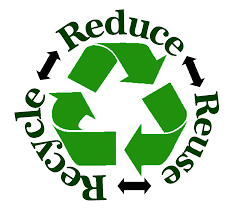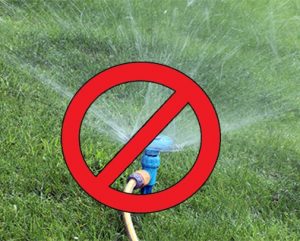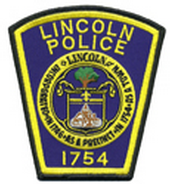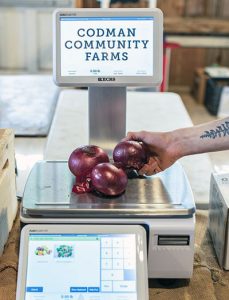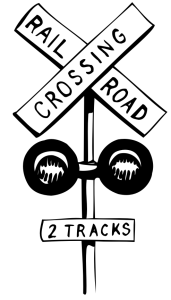Lincolnites are pretty conscientious about trying to recycle, but contamination is a problem here and everywhere else. Through carelessness or misunderstanding, people sometimes throw things that ought to be recycled into the trash, and throw trash into their recycling bin. In this series of articles, the Lincoln Squirrel will look at what happens to everything that gets dropped off at the transfer station as well as some tips on how to recycle more effectively.
Also in this series:
- Part 2: Trash
- Part 3: Recycling beyond single-stream
- Part 4: Recycling beyond the transfer station
- Part 5: The 5 R’s, and some numbers
Like many towns, Lincoln’s transfer station accepts single-stream recycling in a bin where people can toss paper and junk mail, cardboard, metal cans, plastic bottles, clean aluminum foil, and some plastic food and beverage containers.
But then what happens to all that stuff after it leaves town? Waste Management (WM) picks up the roll-off containers of recyclables and takes them to its materials recovery facility (MRF) in Billerica, where everything is dumped onto a tipping floor. The commingled items are then loaded into an elaborate multi-step sorting machine that plucks out different materials at various points. As the items go by on a conveyor belt, human operators also pick out as much nonrecyclable material as they can. See videos of MRFs in action here and here.
Mixed paper and cardboard are easily recyclable and can be made into new cardboard, paper, paper napkins, etc. WM sells most of these materials to Pratt Industries and Westrock, according to Chris Lucarelle, Waste Management’s Area Director for Recycling Operations. Glass gets crushed and made into new glass products as well as fiberglass insulation. Metal cans meet a similar fate.
The biggest issue, of course, is plastic. Before 2018, MRFs sold much of America’s recyclables to China, which used them as raw materials for its growing industrial base but which also led to pollution in that country. But in 2018, China stopped accepting most so-called recyclables from North American and Europe as part of Operation National Sword because the loads were contaminated with too much nonrecyclable material.
As a result, a lot of plastic that was supposedly recycled by Americans goes into landfills and incinerators in the U.S. or is shipped to developing countries without the capacity to properly process it, which in turn results in more pollution of land, sea, and air worldwide (see “Reckoning with the U.S. Role in Global Ocean Plastic Waste,” a 2022 report by the National Academies of Sciences, Engineering, and Medicine).
Recycling plastic is especially problematic because there are so many variations in chemical composition, color, and transparency and many of these items can’t be mixed even after they’re separated from glass, metal, paper, etc. And it’s often too expensive to sort all these types of plastic, especially since it’s usually cheaper to make new plastic rather than use recycled plastic. Also, many well-intentioned residents engage in “wishcycling” — putting nonrecyclable items in their recycling bin and thus contaminating the load, as noted in this 2019 WBUR piece.
There’s a lot of understandable confusion when people try to figure out what plastics can and can’t be recycled. For example, single-use plastic cold drink cups can be recycled, but not their lids or straws. Black plastic takeout containers can’t be recycled, but their clear lids can. And many plastic items actually contain two or more types of plastic, so they’re also not recyclable. The days are gone when you could look at the number inside the triangle on the bottom of a container and immediately tell if it’s recyclable.
Plastic items are labeled with a resin identification number inside a triangular recycling logo that indicates how the plastic was made. However, the recycling logo is deceptive. Just because a package or bottle has a number or recycling symbol doesn’t mean it’s recyclable. Instead, it indicates the molecular structure of the plastic, which is used to categorize what can and can’t be recycled. Plastics labeled #3, #4, #6 and #7 are not recyclable, according to the Conservation Law Foundation (see chart).
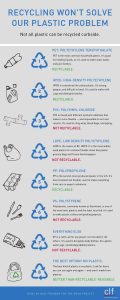
(Source: Conservation Law Foundation)
Some argue that recycling plastic is almost hopeless because of this sorting issue and because disposable plastic is relatively cheap to make as well as sturdy and sanitary. By extending the shelf life of food, plastic packaging actually reduces food waste, which comprises a large portion of household trash (see the “Saving Food” chart in “The Cost of Plastic Packaging”). Composting goes a long way toward reducing the amount of trash that has to be incinerated.
New uses for recycled plastic
However, the market for recycled plastics is slowly growing, due in part to increasing pressure for manufacturers to use more post-consumer resin (PCR) in their products. WM has some of its recycled plastic made into residential bins for its own use (EcoCarts).
None of the plastics from Lincoln that wind up in WM’s Billerica facility are sold overseas, according to Lucarelle. “National Sword proved to be a good thing for U.S. recyclers and we have seen a lot of growth in the domestic market,” he said.
Many plastic bottles are made of polyethylene terephthalate (PET), which is often marked with the #1 symbol. One of the largest purchasers of WM’s PET is Unifi, which uses the plastic to create a textile fiber to make new products such as shoes, clothing and bags. Work clothing made from this fiber is now available to WM employees. WM also sells some of its HDPE and PP (high-density polyethylene and polypropylene, often marked as #2 and #5) to KW Plastics in Troy, Ala., which claims to be the world’s largest plastics recycler and resin supplier for those materials.
State governments are also working to encourage more plastic conservation and recycling by industry. California now requires certain food service facilities to serve customers with packaging that is either reusable, recyclable, or compostable. Last year, Maine became the first state to require producers of packaged goods sold in the state to pay for maintaining and expanding municipal recycling programs — a so-called extended producer responsibility (EPR) law.
Burn, baby, burn
Other ways to dispose of plastic are traditional waste-to-energy incineration and pyrolysis, where mixed plastic is heated in a low-oxygen environment so it breaks into shorter-chain hydrocarbons that can then be used to make fuels and chemical feedstocks that can be fashioned back into polymers, creating a closed loop, according to Chemical and Engineering News (“Should plastics be a source of energy?”). However, as the article notes, waste-to-energy plants can produce only the amount of energy per day that they were designed to. Plastics have a higher energy content than most trash, so if the facility processes more plastics, it has to take in less waste overall.
Many multinational companies are partnering with cement manufacturers to burn unrecycled plastic waste in cement kilns, which operate at a very high temperature. Cement factories have traditionally burned coal, which is a major greenhouse gas producer. Plastic and trash are far cheaper fuel source, but the factories still cause a lot of air pollution, especially in countries where emissions regulations are inadequate or not enforced.
And the bigger problem remains. Less than 10% of all the plastic ever made has been recycled, mostly because it’s too costly to collect and sort. Plastic production, meanwhile, is projected to double within 20 years, according to Reuters.
What you can and can’t recycle in Lincoln
Back here in Lincoln, how does an environmentally conscious resident know what’s recyclable? Recycle Smart MA (a program funded by the Massachusetts DEP) has an excellent Recyclopedia where you can quickly look up hundreds of different items. Waste Management also has a Recycling 101 website. A general rule of thumb: if it isn’t a container — or if you’re in doubt at all — put it in the trash.
Here are a few of the things that many people “wishcycle” that should not go into the single-stream container:
- Single-use plastic drink lids, cutlery, straws
- Polystyrene “to go” containers
- Waxed cardboard milk/juice containers with plastic screw caps
- Frozen food boxes (they also contain wax)
- Paper cold drink cups with a wax coating
- Paper coffee cups and their lids
- Colored plastic cold cups (clear ones are OK)
- Plastic food envelopes for snacks, drink pouches, etc.
- Cardboard food canisters with metal rims containing nuts, chips, etc.
- Black plastic takeout containers (though their clear lids are OK). Why? MRFs sort plastics by bouncing a beam of light off them. Since black plastic absorbs light, it can’t be sorted and goes straight to the incinerator.
- Any kind of plastic bag, wrap or film
- Padded paper mailing envelopes
- Coat hangers, wires, tubing, etc. (these items, along with plastic bags, can tangle the sorting machinery)
- Screws, nuts, bolts, tools, etc.
- Larger metal or plastic objects such as toys, appliances, etc.
- Styrofoam molded package insulation or packing peanuts
- Rigid plastic form-molded packaging (sometimes glued to a cardboard backing)
- Prescription medicine bottles
- Anything contaminated with food
